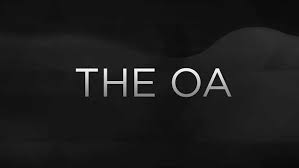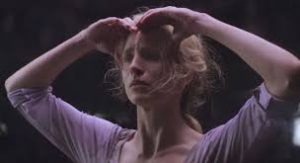I really wanted to love The OA. When we first met, the attraction was strong: supernatural hook, female lead, Jason Isaacs. I looked forward to evenings spent snuggled in intimate, engaging conversation. But as the weeks went by, all the possibilities fizzled to nothing between us. I did love the ambivalence of the ending (it reminded me of the conclusion of the exquisite YA novel, Afternoon of the Elves). Ultimately, The OA and I had to go our separate ways for some very serious reasons. Here’s the basics of our breakup.
Attention: SPOILERS FOLLOW!
 The OA is visually boring. A large part of my love affair with visual media is due to the fact that I am a visual thinker. I work through philosophical problems as if I am building an engine or constructing a building. As a result, there’s nothing I enjoy more than a conversation conducted in a rich symbolic vocabulary. The OA offered me little in this regard. Granted, much of the subject footage is boring to begin with. The characters live in a nondescript housing development and the camera follows them in and out of nondescript buildings, through nondescript rooms and down nondescript streets. The series might have put the anonymity and repetitiveness of the setting to some effect, (see It Follows for how to do suburbia well), but the story seems to have landed there accidentally. Similarly, Prairie’s captivity presented an opportunity to use reflections and frames to muster something approaching commentary, but the show came up with nothing. Without a unifying visual theme, any images The OA does present end up being unintelligible.
The OA is visually boring. A large part of my love affair with visual media is due to the fact that I am a visual thinker. I work through philosophical problems as if I am building an engine or constructing a building. As a result, there’s nothing I enjoy more than a conversation conducted in a rich symbolic vocabulary. The OA offered me little in this regard. Granted, much of the subject footage is boring to begin with. The characters live in a nondescript housing development and the camera follows them in and out of nondescript buildings, through nondescript rooms and down nondescript streets. The series might have put the anonymity and repetitiveness of the setting to some effect, (see It Follows for how to do suburbia well), but the story seems to have landed there accidentally. Similarly, Prairie’s captivity presented an opportunity to use reflections and frames to muster something approaching commentary, but the show came up with nothing. Without a unifying visual theme, any images The OA does present end up being unintelligible.- The pacing was all wrong. Again, tons of unrealized potential. The OA could have controlled the flow of the narrative to replicate the sensation of imprisonment or to critique the meaning of time when every moment is replicated through multiple dimensions. But no. The OA was just paced terribly. Some episodes were painfully slow while others seemed to speed ahead like a runaway train. The finale felt particularly headlong.
- Enough loose ends to knit together another entire show. Why does Prairie make films for Homer? Why is she able to find Homer on the internet when her teenage companions were not? What’s with the dolls? What’s with the wolf sweatshirt? Where the hell is Hap getting his funding from? Who just flies his personal plane to Cuba? Where is the airfield? Why don’t we learn anything about the fourth captive? Why doesn’t she receive a movement? Why five of them? Why did Hap stop gassing his “subjects”? How in the world is he recording their “soundscapes”? How can he possibly get away with killing the ranger and his wife? How am I supposed to believe that school representatives will sell a child for $50,000? Why is the FBI therapist in Prairie’s house when “French” breaks in? But really, an Amazon box under the bed is the series reveal?!
- The description of angels as nothing more than superhuman is unfulfilling. During the whole series, there was no sense that Prairie, being revealed in her identity as The Original Angel, was given any kind of vocation with her new-found powers. Basically, within the world of the series, to be an angel is just to be human with the capability to travel interdimensionally. Granted, angels can also heal and resurrect people, but these gifts are merely incidental in acquiring the skill to escape captivity. When Prairie and Homer heal the ranger’s wife, it is a decision they make, rather than a role they are fulfilling. In addition, the dramatic tension near the end of the series is driven by the arms race between the captive angels and their captor, Hap. Hap has been monitoring the group’s activities and mirroring their Movements, a series of physical positions that promise to unlock new power. If Hap can acquire their power simply by copying their movements, then that power is not connected to vocation. Within the traditions of the Abrahamic religions, angels have specific jobs. They are messengers from or representatives of the divine. Stripped of a divine (or at the very least benevolent) purpose, there is no reason to call Prairie an angel rather than a superhero. But even superheroes usually have a sense that their powers demand some sort of special responsibility or service. The powers in The OA universe come with no moral implications at all. This not only makes for a boring story, but also questions why the show preferred the term angel at all. My guess is that it’s accidental because of the association with near death experiences.

- There is more to human spirituality than noncognitive physicality. I fully realize The OA was looking to tap into the conflict between science and spirituality. Science, portrayed by Hap, reduces mystery into cruel experiments and cold measurements. Meanwhile, Prairie and her group dances intuitive movements to achieve their supernatural escape. I do love The OA’s intention to treat the human body seriously (I have written here about the need for Christianity to recognize the physicality of spiritual experiences). However, it hardly treats the body with technological seriousness. In other words, the body, in The OA, does not become a tool for better understanding the universe. Rather, it is the place where we act out our incomprehension of its mystery. I particularly reject the fact that noncognitive physicality is the only way to achieve spiritual truth. Traditions like yoga and some martial arts insist otherwise. In these practices (and others), the body is carefully trained into positions more in tune with internal physiology and/or external natural order. The mind is not excused from the exercise, but its attention is redirected through the effort. If you’re looking for a fictional example, please read Frank Herbert’s Dune series for an outstanding study on the human body as technology. But The OA doesn’t bother to connect the 5 Movements to anything systematic, inside or out. I applaud questioning whether science can adequately and accurately capture the entire range of human experience, especially those experiences we typically refer to as religious. However, the answer is more than a retreat into primitive physicality. Most troubling, this formulation plays out in the finale as a choice between believing in Prairie or resorting to evidence. Considering the current political climate, I think it’s dangerous to reduce any tension between fact and faith to binary terms. Human genius is not the ability to imagine the untrue. Rather, human genius is the ability to insist on logic without being restrained by it, to engineer the abstract beyond the apparent. Sadly, The OA misses this truth at a time we really need to take an intelligible stand on it.
